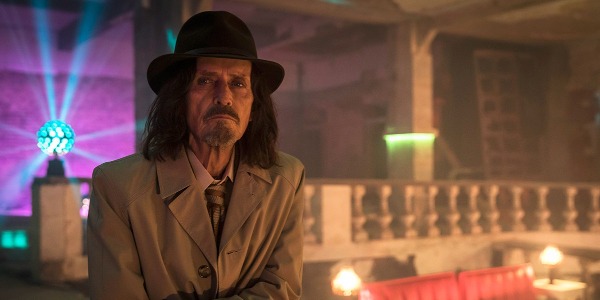Getting to the end of Dreamland is much like waking up from a poorly slept night: hazy, disappointing, and pierced with a hint of confusion. The film, a hyperbolic pulpy noir, is crafted with a very specific audience in mind – those who granted Canadian director Bruce McDonald’s 2008 Pontypool an irrevocable cult status. For all the others who do not fall under the niched umbrella, it is a flawed attempt at a genre movie.
In a misty, European criminal haven, a mysterious hitman, a drug-fuelled Maestro, and a shaggy crime lord see themselves entangled in a twisted pursuit due to a lack of courtesy that results in the need of a little finger to be cut off. Yes, you read that right. Dreamland wants to be viewed as something far from digestible: “We’re in a different world”, announces the hitman when introducing the viewer to this nightmarish limbo.

Over the top is an understatement
Here, more is more is more. Child sex-trafficking, sheepish tong-waggling vampires, ten-year-old suit-wearing mobsters, several chopped pinkies. Despite its best efforts to amp the rhythm with every twist, the film still feels overwhelmingly long, constantly choking on its own eagerness. By the time the narrative is supposed to hit its manic final crescendo, a gangster-filled white wedding, there is just no energy left. McDonald makes it perfectly clear he has no ambition of constructing a refined critique on this twisted futuristic dream world, aiming solely to create a future cult to be discussed in underground forums and midnight screenings.
The editing does very little to salvage the tangled story. Idea after idea is introduced to no development, quickly clogging the already overburdened narrative. Other elements of the mise-e-scéne are quick to fall under the same uninspired umbrella, leaving one to wonder why didn’t McDonald plunge into the madness head first instead of happily nesting in the comfort of the bland.
The outlaw’s moral code
Dreamland attempts to reflect on the tenuous lines of morality inside the criminal sphere. It does so by sending its unsung hero into a murky redemption quest, fuelled by his objection to his boss’ new child sex-trafficking scheme. Stephen McHattie (McDonald’s old Pontypool partner) stars in a dual role, playing both a raggedy kind-eyed saviour and a corrupt, drug-addict Chet Baker-esque maestro. The veteran actor delivers an unsurprising caricature, made better solely by the mediocrity of his colleagues.
A beacon of light amongst it all is Juliette Lewis as The Countess, an over-the-top diplomat wife whose life revolves around luxuriously accommodating all sorts of wrongdoers. How she ended up here is nothing short of puzzling, but it is hard not to gravitate towards the actress’ rambunctious performance as she navigates her disaster-filled castle in a gorgeous red gown, echoing something out of Eyes Wide Shut. When she leads her vampire brother to the dance floor on his wedding night, it is as if the acute labyrinthine of the past hour comes to a welcome halt for a split second.
Conclusion
Dreamland is remarkably disastrous yet instantly forgetful. An aimless blunder of foolery so ludicrous it makes one wonder how it came to be. It will, as intended, work for some, but to the vast majority, it will fall deeply into a very different sort of obscurity.
What is your favourite cult noir film? Tell us in the comments!
Dreamland is currently available on Prime Video.
Watch Dreamland
Does content like this matter to you?
Become a Member and support film journalism. Unlock access to all of Film Inquiry`s great articles. Join a community of like-minded readers who are passionate about cinema - get access to our private members Network, give back to independent filmmakers, and more.